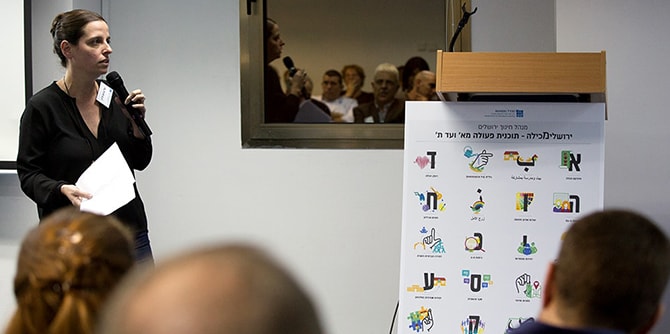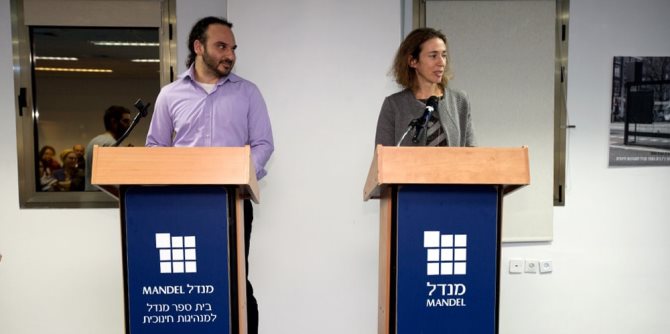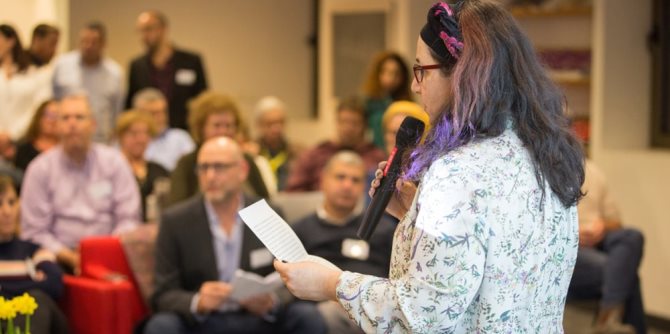In this year’s group exercise, the fellows of Cohort 26 of the Mandel School for Educational Leadership spent three weeks investigating the issue of mainstreaming and inclusion of children with disabilities in the Jerusalem education system – a subject that was chosen jointly by the leadership of the Mandel School and the Jerusalem Education Administration (JEA). As part of the exercise, the fellows interviewed officials of the Ministry of Education, the Jerusalem municipality, and the JEA, as well as school principals, preschool teachers, parents’ representatives, staff of parent support organizations, educational entrepreneurs, representatives of the Israel Association of Community Centers, and members of neighborhood community administrations.

The fellows presented their findings and recommendations at an event held on January 21, 2019, at the Mandel School for Educational Leadership. The event was attended by
Hagit Moshe, deputy mayor of Jerusalem and holder of the city council’s education portfolio;
Moshe Vigdor, director general of the Mandel Foundation–Israel;
Aviv Keinan, director of the JEA; and
Miri Navon, director of the Ministry of Education’s senior department for implementation of reforms in integration and inclusion.
“The decision to explore the issue of inclusion of children with special needs in the education system, in light of recent amendments to the law, requires developing insights regarding an issue that is very current, challenging, and controversial, and that requires real change,” said Deputy Mayor Hagit Moshe. “The process you have conducted over the last three weeks attests to the continued commitment of the fellows and graduates of the Mandel School for Educational Leadership to innovation and to bringing about substantial change.”

The recommendations of the group exercise were published in a summary document that focuses on three axes of action for mainstreaming and inclusion: the school axis, the community axis, and the municipal axis. Taken together, the recommendations propose a plan of action that takes into account the unique characteristics and complexities of the city of Jerusalem and what the Jerusalem Education Administration will be able to implement during the 2019–2020 school year.
The document’s recommendations address such questions as:
- What should the JEA’s plan of action be in order to increase the integration of children from the special education system into regular classes?
- What conditions would be required to reduce the number of appeals to special education placement committees?
- What is needed in order to introduce mainstreaming education into Jerusalem’s Haredi (ultra-Orthodox) education system and the Arab education system in East Jerusalem?
Two of the chapters in the document are dedicated to the separate education systems that serve Jerusalem's Arab and Haredi populations.
“The group exercise is a major component of the second-year program of study here at the Mandel School for Educational Leadership," said
Danny Bar Giora, director of the School. "The exercise takes on the challenge of addressing current issues of concern to the education system. This year, we conducted the exercise in conjunction with a local authority for the first time." Turning to the fellows, he added: "Over the last few weeks, you have explored the world of special education, with its special beauty and immense challenges. You quickly understood that you were examining a much broader and more central social issue. I’m convinced that this journey provided each and every one of you with a valuable learning experience.”

Aviv Keinan, director of the Jerusalem Education Administration, responded to the fellows' presentation by affirming: “We will not be ending our relationship with the fellows this evening, with regard to the implementation of the practical plan. Our cooperation will continue so that the 2019–2020 school year that opens in the fall will be different, in terms of the children’s lives, the school environment, and the schools’ resources.”
Miri Navon, director of the Ministry of Education’s senior department for implementation of reforms in integration and inclusion, thanked the fellows for the document they produced, and for agreeing to take on the challenge of developing a plan for mainstreaming and inclusion in the educational system in Jerusalem. "The brightest spot in the plan you have proposed is the aspect of community – the recommendation to pool community resources in order to promote inclusion and integration. The community itself has a great many resources that schools lack,” she said.
As part of the exercise, the fellows were invited to participate in a public forum on inclusion that was held at the Gilo neighborhood community administration in Jerusalem. This forum brought together people with disabilities, their families, and representatives of disabilities nonprofits, the community administration, and the municipal welfare division to discuss the question of how to create an inclusive culture of leisure that is accessible to people with disabilities and their families. The discussions at the forum inspired the fellows to produce a video clip of interviews with some of the people with disabilities who had participated in the event. The video that they produced will be used as a trigger for honest dialogue at local schools in Gilo, which will serve as a gateway to a shared community that is inclusive of everyone.
The video produced as part of the Group Exercise of Cohort 26
